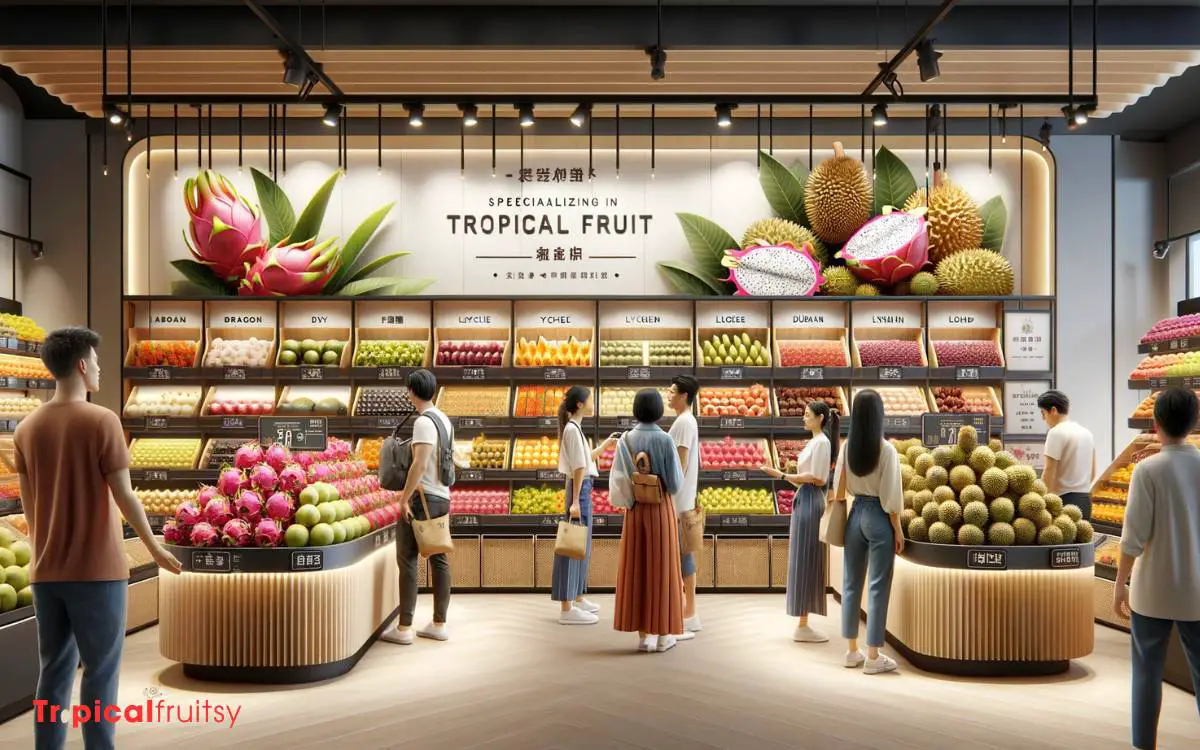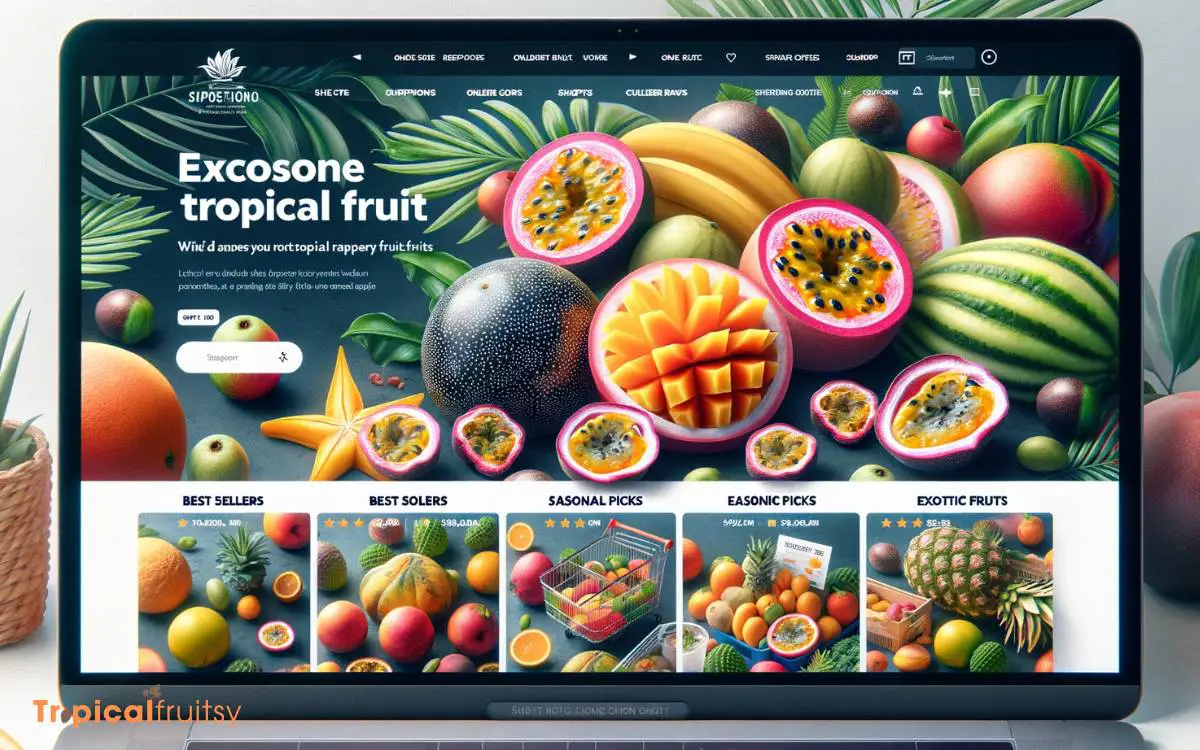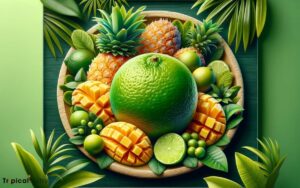Where to Buy Tropical Fruit? Explained!
If you’re looking to buy tropical fruit, there are several options available. You can find a variety of tropical fruits at local farmers’ markets, specialty grocery stores, online vendors, ethnic food markets, and through Community Supported Agriculture (CSA) programs.
Each of these sources offers a different selection and shopping experience to help you enjoy the unique tastes and nutritional benefits of tropical fruits.
Tropical fruits are increasingly popular due to their unique flavors and health benefits.
Here’s where you can buy them:
Explore the exotic flavors and nutritional power of tropical fruits from a variety of convenient shopping sources.

Key Takeaway
Tropical Fruit Shopping Sources and Vendors
| Source Type | Description | Example Vendors or Markets |
|---|---|---|
| Farmers’ Markets | Fresh, locally-sourced tropical fruits in peak seasons | Local city or town farmers’ markets |
| Specialty Grocery Stores | Diverse inventory of tropical fruits year-round | Whole Foods, Trader Joe’s |
| Online Vendors | Doorstep delivery of exotic fruits | Tropical Fruit Box, Miami Fruit |
| Ethnic Food Markets | Tropical fruits for specific regional cuisines | Local Asian, Latin American markets |
| CSA Programs | Seasonal tropical fruits directly from the farm | Local CSA programs in tropical regions |
Local Farmers’ Markets

While supermarkets offer convenience, local farmers’ markets are often the best venues to purchase fresh tropical fruits due to their direct connection to regional growers.
These markets typically provide an array of seasonal specialties, sourced directly from local agricultural landscapes, ensuring peak ripeness and optimal flavor profiles that are often lost in extended supply chains.
Savvy consumers frequent these markets for their superior quality and variety, which can include exotic offerings not commonly stocked in conventional grocery outlets.
By engaging with farmers, customers gain insights into the provenance and cultivation methods of the produce, fostering a deeper appreciation for the fruits and promoting sustainable agricultural practices.
In the context of tropical fruits, the farmers’ markets serve not merely as retail points but as hubs of agricultural knowledge and community engagement.
Specialty Grocery Stores

Although local farmers’ markets offer a range of fresh options, specialty grocery stores are another excellent source for tropical fruits, often featuring a curated selection from various regions.
When seeking out these establishments, consider the following:
- Inventory Variety: Assess the store’s array of tropical fruits, giving preference to those with a broad and rotating stock, indicating regular freshness.
- Supply Chain Transparency: Opt for stores that provide clear information about the origin of their produce and the ethical standards of their sourcing practices.
- Expertise of Staff: Choose stores where the staff has in-depth knowledge of tropical fruit varieties, their seasonal availability, and ideal ripeness indicators.
- Preservation Techniques: Investigate if the store employs proper storage methods to maintain the optimal quality and flavor of their tropical offerings.
Online Tropical Fruit Vendors

Online tropical fruit vendors offer a convenient alternative for consumers seeking a diverse selection of exotic produce from the comfort of their homes.
These vendors specialize in procuring and distributing a wide array of tropical fruits, often with a direct line from the farm to the consumer, ensuring peak freshness and flavor.
The industry operates through sophisticated e-commerce platforms, enabling detailed product descriptions, customer reviews, and secure payment options.
Consumers can explore an extensive catalogue of tropical fruits, including rare finds that may not be readily available at local supermarkets.
Purchasing tropical fruits online also often involves expert packaging to maintain the integrity of the fruits during transit.
Many online vendors are committed to sustainability, using eco-friendly packaging materials and carbon-neutral shipping solutions.
As we consider the modern conveniences of online shopping, let’s explore another vibrant source of tropical fruits: ethnic food markets.
Ethnic Food Markets

The digital realm to local communities, ethnic food markets provide a treasure trove of tropical fruits often reflective of the diverse cultures they serve.
These specialized outlets are pivotal for consumers seeking authenticity as well as variety in their fruit selection.
Below are four key aspects that define the role of ethnic markets in the tropical fruit industry:
- Cultural Authenticity: Ethnic markets offer fruits that are integral to the traditional diets of the communities they represent.
- Freshness and Variety: These markets frequently source their produce directly from growers, ensuring freshness and a wide selection of tropical fruits.
- Knowledgeable Staff: Employees are often well-versed in the uses and benefits of the fruits, providing valuable guidance to shoppers.
- Community Hub: Ethnic food markets serve as cultural gathering spots, fostering a sense of community and shared culinary heritage.
Community Supported Agriculture (CSA) Programs
Community Supported Agriculture (CSA) programs offer consumers a direct pipeline to fresh, locally grown tropical fruits through seasonal subscriptions.
By participating in a CSA, members invest in their local farm’s production and in return receive a share of the harvest.
This model ensures that consumers get the highest quality produce, often picked at the peak of ripeness, while also fostering a sustainable and equitable food system.
To illustrate the benefits of CSA membership, consider the following table:
| Benefit | Description | Impact on Tropical Fruit Access |
|---|---|---|
| Freshness | Produce is harvested at peak ripeness. | Ensures optimal flavor and nutrition. |
| Support | Investments help sustain local farms. | Increases variety and availability of fruits. |
| Community | Connects consumers with growers. | Fosters understanding of agricultural practices. |
| Seasonality | Emphasizes eating fruits in season. | Encourages diverse, year-round consumption. |
Engaging with a CSA can deepen one’s appreciation for tropical fruits and the farming process, while also promoting local economies and environmental stewardship.
Is it possible to find the same tropical fruits in Kauai as in other locations?
Yes, you can find a variety of tropical fruits in Kauai, similar to those in other locations. Some common ones include pineapple, papaya, mango, and guava. These fruits thrive in Kauai’s tropical climate, making them easily available for locals and visitors to enjoy.
Where To Buy Tropical Fruits Near Me
To find a place to buy tropical fruits near you, you can try the following options:
- Local Grocery Stores: Most grocery stores carry a variety of fruits, including tropical ones. Visit your local supermarket or grocery store and check their fruit section.
- Farmers’ Markets: Farmers’ markets often have a diverse selection of fresh, locally sourced fruits, including tropical fruits when they are in season. Use a search engine or a local directory to find farmers’ markets near you.
- Specialty or International Grocery Stores: Stores that specialize in international or ethnic foods may have a wider selection of tropical fruits. Look for Asian, Latin, or African markets in your area.
- Health Food Stores: Some health food stores focus on offering organic and exotic fruits, including tropical varieties.
- Online Marketplaces: Consider using online marketplaces like Amazon Fresh or Instacart to have tropical fruits delivered to your doorstep. Be sure to check the availability in your area.
- Local Fruit Stands: Depending on where you live, you might find fruit stands or roadside vendors selling fresh fruits, including tropical ones.
- Community Supported Agriculture (CSA) Programs: Joining a CSA program might provide you with a regular supply of fresh, locally grown fruits, which can include tropical fruits if they are grown in your region.
- Social Media and Apps: Some community groups on social media platforms or mobile apps like Nextdoor may provide information on where to find local sources for tropical fruits.
- Local Farms: If you’re in a region where tropical fruits are grown, you might be able to visit local farms and buy fruits directly from the source.
- Ask Locals: Sometimes, the best way to find local sources for tropical fruits is by asking locals or friends in your area. They might know of hidden gems or seasonal fruit sources.
Remember that the availability of tropical fruits can vary depending on your location and the season, so it’s a good idea to call ahead or check online to see what’s currently in stock or in season.
Conclusion
Venturing into the world of tropical fruits offers a cornucopia of vibrant flavors and exotic experiences.
Patrons of the global marketplace now have the means to transcend geographical boundaries, with the fruit of equatorial orchards a mere click or stroll away.
As seekers of these succulent treasures navigate through farmers’ markets to digital storefronts, they participate in a symphony of commerce that celebrates the diversity of nature’s bounty and the interconnectedness of our modern world.






